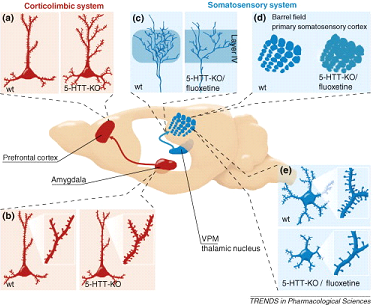
RESPOND
(Research on Serotonin in the Pathogenesis Of Neurodevelopmental Disorders)
RESPOND responds to the increasing burden on patients and societies imposed by neurodevelopmental disorders such as attention-deficit hyperactivity disorder (ADHD), autism spectrum disorders (ASD), and schizophrenia. The neurotransmitter serotonin has been implicated in the pathogenesis of these diseases and is a known regulator of neurodevelopment. However, the relevance of serotonin for the pathogenesis of these diseases and the involved mechanisms remain to be clarified. RESPOND will analyze neurodevelopmental processes and disease-related behavior in three novel rat strains with targeted genetic alterations in two major components of the serotonin system, TPH2, the serotonin-synthesizing enzyme, and SERT, the serotonin reuptake transporter. Rats offer more suitable behavioral assays for the research on ADHD, ASD, and schizophrenia than mice and are therefore the preferred animal model. In parallel pluripotent stem cells will be isolated from patients with these diseases and from the rats with dysregulated central serotonin system and used to assess alterations in differentiation and in-vitro as well as in-vivo development. The five partners from Germany, Poland, France, and The Netherlands will join their highly complementary expertise in RESPOND to provide a comprehensive description of serotonin’s role in neurodevelopmental disorders and eventually establish novel animal and cellular models for the development of therapies for ADHD, ASD, and schizophrenia.
Partners:
| Germany | Michael Bader, Natalia Alenina | Max-Delbrück-Center for Molecular Medicine (MDC), Berlin |
| Germany | Klaus-Peter Lesch, Frank Edenhofer | Division of Molecular Psychiatry, University Hospital Würzburg, Institute of Anatomy and Cell Biology, Julius-Maximilians-University Würzburg |
| Poland | Piotr Popik, Agnieszka Nikiforuk | Institute of Pharmacology, Polish Academy of Sciences, Krakow |
| France | Patricia Gaspar, Stephane Nedelec | Inserm, UMR-S 839, Paris |
| The Netherlands | Judith Homberg | Radboud University Medical Centre, Donders Institute for Brain, Cognition, and Behavior, Department of Cognitive Neuroscience, Nijmegen |